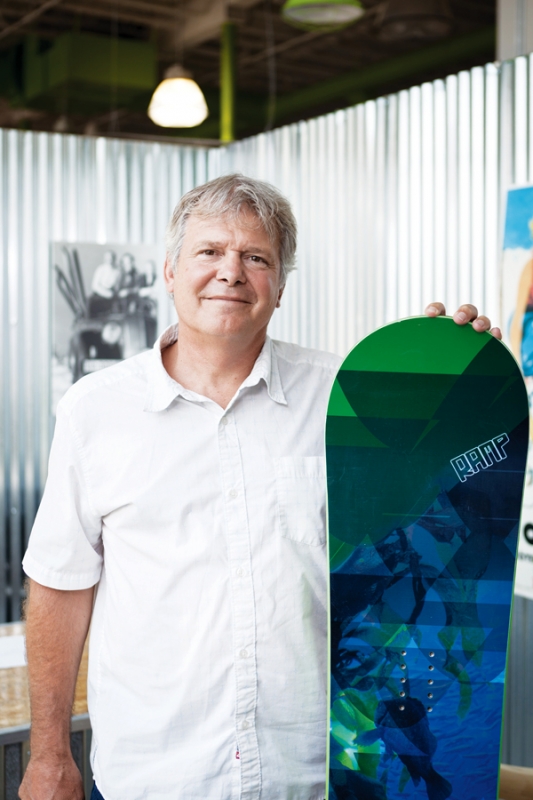
The Snow is Always Greener: Ramp Sports’ Revolution
Ski / Snowboard
Being green, giving back, voting independent and the apocalyptic “2012” are all pervasive ideas that mark the minds of those living in the 21st century. With so much consciousness being raised in our consumer society, it’s hard for companies these days to get away with engaging in the global marketplace without assuming responsibility for the resources they use. Based in Park City, RAMP Sports is rapidly making its way to the top of the winter sports industry with quality, handmade and environmentally friendly hard goods.
Mike Kilchenstein is a pioneer. RAMP’s owner, founder and president, and green economist, Kilchenstein spent 35 years of his career prior to starting RAMP Sports manufacturing skis for Rossignol. Experts in the ski industry, Rossi asked Kilchenstein to launch their Roxy Women’s Ski line, and, after taking the position, he quickly realized the flaws and breakdown of their business and marketing model. “I just became disillusioned with it all,” says Kilchenstein. “Rossignol is one of the largest ski manufacturers, and, as a customer who trusts and buys their excellent skis, you’d think that you could call headquarters and speak to a customer service representative if you had a complaint.
At Rossignol there is no customer service rep.” Rossignol isn’t the only company who operates with “shop only” reps instead of directly with the customer, but this lack of care from producer to buyer is what fueled the idea for Kilchenstein to start his own ski company. It took him a solid year, but after realizing that being a direct sales manufacturer allowed for a superior product to be made and responsibly distributed, Kilchenstein found the right partner—music manager Victor Waryas of Red Light Management—to create RAMP (Riders, Artists and Musicians Project) Sports, and, in December of 2010, they went live.
RAMP’s conscientious customer practices transcend into the production of their goods. “We first started using the highly renewable and hardwood bamboo as the core of our boards and skis,” says Kilchenstein. “One thing led to another, and we realized that trying to be clean and green with every practice came easier than we thought, and a lot of people started to catch on and present methods to enhance our environmental awareness.” Kilchenstein was firm in his resolution to be an earth-friendly company that made progressive products that skiers and snowboarders would love to ride, but he didn’t know how to manufacture without creating a significant carbon footprint.
“Once a multi-thousand dollar mold is made as a prototype for a ski or snowboard, that’s it, nothing can be manipulated or changed. If the manufacturer wants a new model of a ski, a new mold has to be made, and the entire process becomes wasteful.” Kilchenstein then teamed with aerodynamic engineer Christian Alary who also had experience making skis, and had invented a computer-patented process where DXF files are used to create and manipulate styles while using the original mold. “So, next year, when we want to alter our current ride models, all we have to do is change the DXF file. No rebuilding mold after mold, wasting money, resources, time and products,” says Kilchenstein. “Right now, with only two technicians and an engineer working at our Park City headquarters, we produce about 40 sets of skis a week and are able to make a profit. Larger companies, to meet profit margins, must produce anywhere from 2,000 to 3,000 skis per week.”
The revolutionary way RAMP is manufacturing, coupled with their direct-sales business approach, gives them an edge in the industry. “The nationwide shops we sell to at resorts amount to less than 20, but we prefer the customer to buy directly from us online. This helps cut as much as one third of the manufacturing and consumer cost and allows for money to be spent on green processes and technical designs. We are just as competitive as Burton or Head, but our method of doing business is what makes our company progressively conscious.” Anytime you buy from RAMP, your new ride is packaged in a reusable travel bag that prevents the use of cardboard––another small step the company decided to take to support their green responsibility.
Besides adhering to RAMP’s core value of consciousness, Kilchenstein, along with artist/designer Polly Hopkins, wanted to maintain the irreverent status quo on ride styles with savvy graphics and witty model names. Their women’s snowboard was proudly named the Beaver, and their men’s ski model, the Groundhog. Of course, each model bears the graphic of their namesake. A common strength of design on most of RAMP’s models is the rustic bamboo wood that overtly lies behind their graphics to create a natural yet innovative style. Other styles include the Peacepipe ski and the Lobstah snowboard. Whatever the art may be for the yearly models, Kilchenstein tries for themes that the customer will find clever. O.G. athletes, like snowboarder Ross Powers and skier Donna Weinbrecht, are among those who ride and represent RAMP, and it was Powers who came up with the acronym RAMP for the company’s name.
With ever-growing resources available for communities and businesses to stay ahead with clean practices, RAMP does its best to be progressive. As a customer, you not only get technical and quality products when you buy from RAMP, but you also support eco-friendly living. Contribute to sustainability by purchasing RAMP Sports products online or at exclusive resort ski shops around the country.


